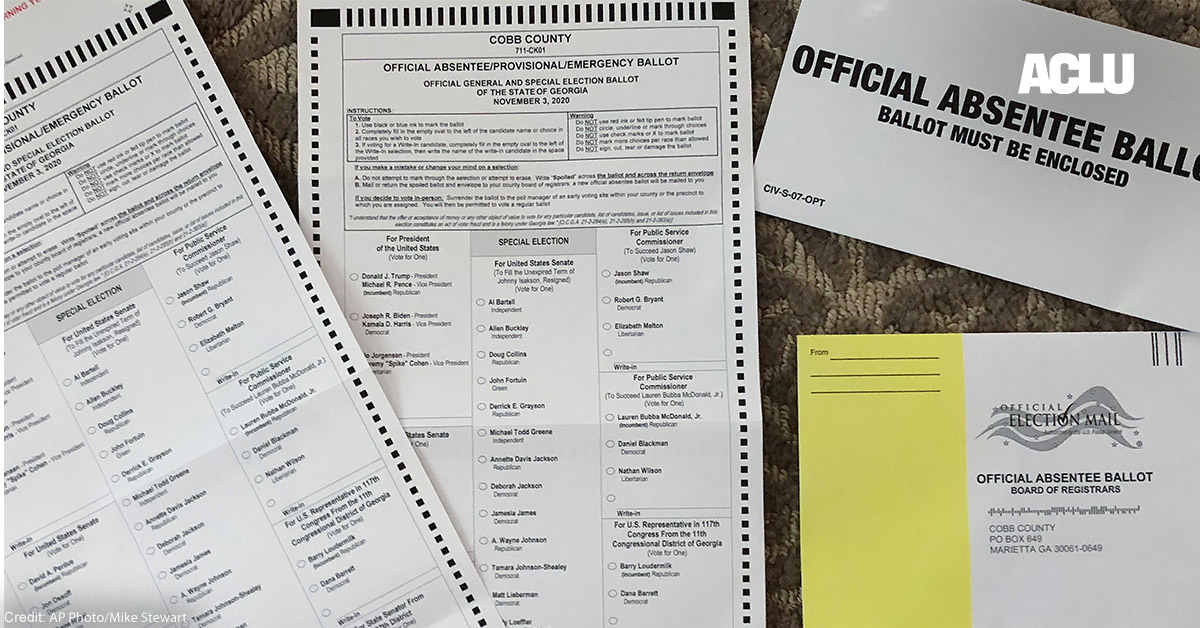
Cook v. Cobb County
What's at Stake
On November 4, 2022—the last day of early voting in Georgia and four days before the November 2022 midterm elections—Cobb County Elections Director Janine Eveler disclosed for the first time that approximately 1,036 absentee ballots marked as issued on October 13, 2022 and October 22, 2022 had never been mailed to voters, due to staff error. The ACLU and co-counsel sued on behalf of several affected voters to ensure that plaintiffs could vote in the 2022 midterm election and that no other voters were affected by Cobb County's error.
Summary
On November 4, 2022—the last day of early voting in Georgia and four days before the November 2022 midterm elections—Cobb County Elections Director Janine Eveler disclosed for the first time that approximately 1,036 absentee ballots marked as issued on October 13, 2022 and October 22, 2022 had never been mailed to voters, due to staff error. Upon learning this news, the ACLU heard from several Georgia voters who: (i) temporarily lived out of state; (ii) requested absentee ballots in October 2022; (iii) never those absentee ballots; and (iv) when they contacted Cobb County to inquire about the status of those ballots, were told that their absentee ballots had likely been sent out and to await delivery of their ballots in the mail. While some of the 1,036 voters voted in-person, hundreds of voters still needed absentee ballots just days before Election Day, many of whom lived hundreds or thousands of miles away from Georgia.
On November 6, 2022, the ACLU, ACLU of Georgia, Southern Poverty Law Center, and Dechert LLP filed a complaint and emergency motion for an interlocutory injunction and temporary restraining order on behalf of Georgia voters on the brink of disenfranchisement due to the county’s failure to send their absentee ballots.
The next day, on November 7, 2022, the Superior Court for the State of Georgia, in Cobb County, issued an order approving the parties’ consent order. The Court ordered that Cobb County must: (i) extend the ballot receipt deadline for all affected voters by six days, to November 14, 2022, the same deadline for Uniformed and Overseas Voters, provided those ballots were postmarked by Election Day; (ii) send replacement absentee ballots on that same day, November 7, to impacted voters who had not yet received a ballot and who had not already voted, via overnight mail; (iii) send immediate notice by email and text message to affected voters and release a public announcement on its website; and (iv) permit affected voters to vote in-person, by replacement absentee ballot, or by Federal Write-In Absentee Ballot (“FWAB”). One day later, on Election Day, the Court entered an amended consent order to “add language permitting any remaining unsent absentee ballots [to] be delivered to Affected by the deputy registrars, attorneys barred by the State of Georgia who are not law enforcement officers, or private courier services.”
While the litigation was a success, Plaintiffs’ attorneys noted that there was “a direct correlation between” Georgia’s anti-voter bill Senate Bill 202 (“SB 202”)—which the ACLU, ACLU of Georgia, and other co-counsel have challenged—and Cobb County’s error. SB 202 reduced the timeframe for counties to receive and process absentee ballot requests, which “put tremendous pressure on elections officials to accomplish a number of responsibilities under a very tight timeline, and in Cobb County, that pressure [] resulted in a huge error and hundreds of voters at risk of being disenfranchised."
Legal Documents
-
11/08/2022
Amended Consent Order -
11/07/2022
Voluntary Dismissal -
11/07/2022
Consent Order -
11/06/2022
Motion & Brief in Support of TRO and Preliminary Injunction -
11/06/2022
Complaint
Date Filed: 11/06/2022
Affiliate: Georgia
Press Releases
ACLU and SPLC File Emergency Litigation to Ensure Cobb County Residents Can Vote Absentee After Local Board of Elections Fails to Send Over 1,000 Ballots